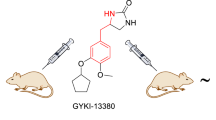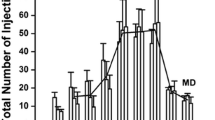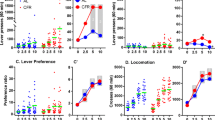Abstract
Rats were trained to self-administer IV-delivered etonitazene while food satiated. A wide range of etonitazene doses (5–80 μg/kg) and saline were tested under food satiation and food deprivation conditions. Food deprivation produced a parallel increase in the dose-response function under FR 1 and FR 16 schedule conditions.
Similar content being viewed by others
References
Carroll ME, Boe IN (1982) Increased intravenous drug self-administration during deprivation of other reinforcers. Pharmacol Biochem Behav 17:563–567
Carroll ME, France CP, Meisch RA (1979) Food deprivation increases oral and intravenous drug intake in rats. Science 205:319–321
Carroll ME, France CP, Meisch RA (1981) Intravenous self-administration of etonitazene, cocaine and phencyclidine in rats during food deprivation and satiation. J Pharmacol Exp Ther 217:241–247
Carroll ME, Meisch RA (1980) Oral phencyclidine (PCP) self-administration in rhesus monkeys: Effects of feeding conditions. J Pharmacol Exp Ther 214:339–346
Carroll ME, Stotz DC (1983) Oral d-amphetamine and ketamine self-administration by rhesus monkeys: Effects of food deprivation. J Pharmacol Exp Ther 221:28–34
Garza R de la, Bergman J, Hartel CR (1981) Food deprivation and cocaine self-administration. Pharmacol Biochem Behav 15:141–144
Kliner DJ, Meisch RA (1982) The effects of food deprivation and satiation on oral pentobarbital self-administration in rhesus monkeys. Pharmacol Biochem Behav 16:579–584
Lang WJ, Latiff AA, McQueen A, Singer G (1977) Self-administration of nicotine with and without a food delivery schedule. Pharmacol Biochem Behav 7:65–70
Meisch RA, Thompson T (1973) Ethanol as a reinforcer: Effects of fixed-ratio size and food deprivation. Psychopharmacology (Berlin) 28:171–183
Oei TPS, Singer G, Jeffreys D, Lang W, Latiff A (1978) Schedule-induced self-injection of nicotine, heroin and methadone by naive animals. In: Colpaert F, Rosecrans J (eds) Stimulus properties of drugs: Ten years of progress. Elsevier North Holland, Amsterdam, pp 503–516
Takahashi RA, Singer G, Oei, TPS (1978) Schedule-induced self-injection of d-amphetamine by naive animals. Pharmacol Biochem Behav 9:857–861
Weeks JR (1972) Long term intravenous infusion. In: Myers RD (ed) Methods in psychobiology, vol 2. Academic Press, London, pp 155–168
Author information
Authors and Affiliations
Rights and permissions
About this article
Cite this article
Carroll, M.E., Boe, I.N. Effects of dose on increased etonitazene self-administration by rats due to food deprivation. Psychopharmacology 82, 151–152 (1984). https://doi.org/10.1007/BF00427762
Received:
Accepted:
Issue Date:
DOI: https://doi.org/10.1007/BF00427762




